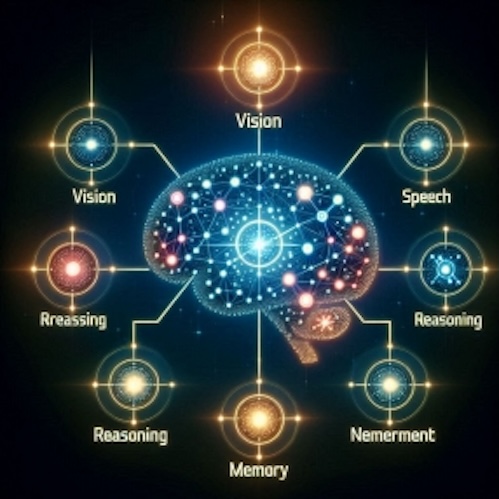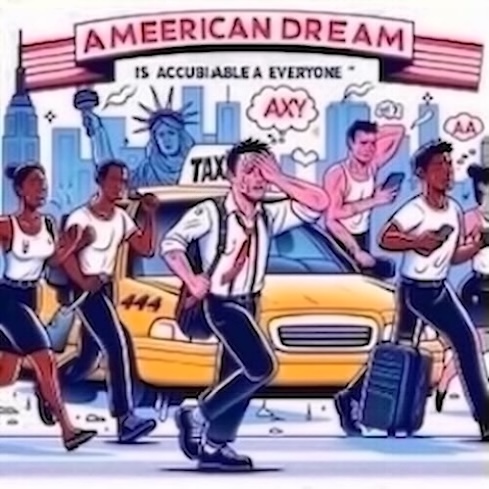Origins of Misleading Narratives!
Origins of Misleading Narratives provides examples and insights to help you recognize, understand, and challenge dominant authoritative narratives. By making informed decisions, you can actively combat misinformation and break free from deceptive storytelling.
 Origins of Misleading Narratives - Examples of Misleading Narratives: An image illustrating a towering giant rises from a river, carrying the immense weight of books on its shoulders... symbols of enforced narratives. Its burning devil-like eyes glow ominously, casting a fiery reflection on the water. Below, boats filled with people sail away, seeking escape from the creature’s influence. On the shore, three figures stand, one pointing toward the giant, as if warning others of its presence. The scene is rich with symbolism, depicting the struggle between imposed ideologies and the pursuit of freedom.
Origins of Misleading Narratives - Examples of Misleading Narratives: An image illustrating a towering giant rises from a river, carrying the immense weight of books on its shoulders... symbols of enforced narratives. Its burning devil-like eyes glow ominously, casting a fiery reflection on the water. Below, boats filled with people sail away, seeking escape from the creature’s influence. On the shore, three figures stand, one pointing toward the giant, as if warning others of its presence. The scene is rich with symbolism, depicting the struggle between imposed ideologies and the pursuit of freedom.These narratives are linked to numerous terms, each explored through interconnected pages that reveal their deeper connections. Additionally, these pages are part of a broader network, spanning over 24 sections that examine historical frameworks from the pre-Cold War era to the present day.
Below, you’ll find the intertwined articles listed by titles, which you can explore within the Global Dynamics sections:
- Why Expanding Horn Africa to Include Other States and Global Impacts?
- A New Era of Chaos and Distrust is Shaping!
- Pre-Cold War Era of Colonialism & Imperial Rivalries!
- Pre-Cold War American Expansionism!
- The Cold War Era: A Battle of Ideologies and Influence!
- Why Do Nations Fragment When Unity is Their Greatest Strength?
- Eastern Europe Socialist Bloc Fragmentation!
- Sudan and U.S. Policy: A Terrorism Connection? What's The Real Story?
- Eritrea Was Too Late to Independence Due to Colonial Conspiracies!
- Namibian Road to Independence From Liberation to Sovereignty!
- The Post-Cold War Era: A Shifting Global Landscape!
- How Economics, Ideology, and Geopolitics Fragment Nations and Create New Ones?
- New World Order: Stability or Chaos?
- Why Am I Saying A New Era of Disorder and Doubts is Shaping?
- Rewriting History: The Lies We Inherit!
- Illusion of Institutional Narratives!
- Why Prevailing Perspectives Fail Us?
- Conventional Narratives Are Always Wrong!
- Rewriting History: The Lies We Inherit!
- How Established Opinions Shape Perception?
- Established Frameworks Invisible Forces!
- Dominant Perspectives Shape Our World!
- Mainstream Ideologies Shape History!
- Origins of Misleading Narratives!
- Breaking the Illusion of Truth: Psychological Liberation & Intellectual Growth!
- Social Norms Shape Consumer Behavior!
Unraveling Misleading Narratives: Understanding Truth for a Better Life!
In a world filled with information, misleading narratives shape our beliefs, influence our decisions, and impact society in ways we often don’t realize. Some of these narratives stem from economic theories, historical distortions, scientific misconceptions, and cultural conditioning... ideas that have been passed down for generations, sometimes without question.
This page explores the origins, persistence, and consequences of misleading narratives, helping readers recognize falsehoods, challenge assumptions, and make informed choices. By understanding how these narratives took root and continue to shape our world today, we can:
- Think critically about the information we consume.
- Avoid falling into harmful misconceptions that affect health, finances, and personal well-being.
- Engage in meaningful discussions that promote truth and progress.
Each article on this page provides historical context, real-world examples, and insights into how these narratives influence modern society. Whether it’s economic myths, scientific misinformation, or cultural beliefs, uncovering the truth empowers us to navigate life with clarity, confidence, and a deeper understanding of the world around us.
The Origins of Misleading Narratives: How They Take Root and Persist?
Misleading narratives shape public perception, influence decision-making, and even alter historical events. But where do they come from?
Understanding their origins requires examining cognitive biases, social influences, and historical patterns that allow deceptive stories to flourish.
1. Cognitive Biases: The Psychological Foundation of False Narratives
Our brains are wired to seek patterns and simplify information, sometimes at the expense of accuracy. Several cognitive biases contribute to the formation of misleading narratives:
- Confirmation Bias: People tend to accept information that aligns with their existing beliefs while ignoring contradictory evidence.
- Memory Distortions: Human memory is malleable, meaning past events can be unintentionally altered or misremembered.
- Availability Heuristic: We judge the likelihood of events based on how easily examples come to mind, making dramatic or widely reported stories seem more common than they are.
These biases create fertile ground for false narratives to take hold, especially when reinforced by social and media influences.
2. Social Influence: How Narratives Spread and Gain Credibility
Misleading narratives often originate from social reinforcement, when groups collectively accept and spread a distorted version of reality. Key factors include:
- Echo Chambers: Social media and closed communities amplify certain perspectives while filtering out opposing viewpoints.
- Authority Figures: When influential figures endorse a narrative, it gains credibility, even if it lacks factual basis.
- Cultural Traditions: Some misleading narratives stem from long-standing societal beliefs that persist despite evidence to the contrary.
Once established, these narratives become self-reinforcing, making them difficult to challenge.
3. Historical Roots: How Misleading Narratives Shape History
Throughout history, misleading narratives have been used to justify actions, control populations, and shape ideologies. Examples include:
- Propaganda in Wartime: Governments have historically used misleading narratives to rally support and demonize opponents.
- Economic Myths: False narratives about financial systems have led to misguided policies and economic crises.
- Scientific Misconceptions: Ideas like phrenology (the belief that skull shape determines intelligence) persisted for decades despite lacking scientific validity.
These historical examples show how misleading narratives can shape entire societies, often with long-lasting consequences.
4. The Role of Media and Technology in Narrative Formation
Modern technology accelerates the spread of misleading narratives through:
- Social Media Algorithms: Platforms prioritize engagement, often amplifying sensational or misleading content.
- Misinformation Campaigns: Deliberate efforts to spread false information for political or financial gain.
- Deepfake Technology: AI-generated content blurs the line between truth and fiction.
As technology evolves, so does the complexity of misleading narratives, making critical thinking more essential than ever.
Why Understanding Narrative Origins Matters?
Recognizing the origins of misleading narratives helps individuals question assumptions, seek reliable sources, and challenge falsehoods. By understanding how these narratives take root, we can work toward a more informed and rational society.
Examples of Misleading Narratives!
Examples of misleading conventional narratives that have shaped history, politics, and society:
1. Political Narratives
- "Trickle-down economics benefits everyone." This idea suggests that tax cuts for the wealthy will eventually benefit lower-income groups, but many economists argue that it primarily increases wealth inequality.
- "A rising tide lifts all boats." This phrase implies that economic growth benefits everyone equally, but in reality, wealth distribution often remains uneven.
- "The stock market reflects the health of the economy." While stock markets can indicate investor confidence, they don’t necessarily reflect the financial well-being of the average citizen.
2. Historical Narratives
- "Columbus discovered America." Indigenous peoples had lived in the Americas for thousands of years before Columbus arrived, making this claim misleading.
- "The American Dream is achievable for everyone." While hard work can lead to success, systemic barriers often prevent equal opportunities for all.
- "Blacks were better off as slaves." A deeply harmful and false narrative used to justify slavery and oppression.
3. Healthcare Narratives
- "If you don’t eat fat, you won’t get fat." This oversimplifies nutrition healthy fats are essential for bodily functions, and excessive sugar intake is often a bigger culprit in weight gain.
- "Vaccines cause autism." A widely debunked claim that has led to vaccine hesitancy and public health risks.
- "Homeopathy is effective." While some people believe in homeopathic treatments, scientific studies have found no evidence that they work beyond a placebo effect.
4. Social & Cultural Narratives
- "Kindness is weakness." This discourages empathy and emotional intelligence, reinforcing toxic behaviors.
- "Apologizing is a sign of weakness." In reality, taking responsibility for mistakes is a sign of strength and maturity.
- "Leisure is laziness." Many cultures glorify constant work, but rest and relaxation are essential for mental and physical health.
5. Religious & Paranormal Narratives
- "The United States is a Christian nation." While Christianity is prevalent, the U.S. was founded on principles of religious freedom, not a singular religious identity.
- "Alien abductions are common." While many claim to have experienced them, there is no scientific evidence to support widespread alien abductions.
These narratives persist because they are often repeated by influential figures, media, and institutions. Challenging them requires critical thinking, independent research, and a willingness to question widely accepted beliefs.
The Origins of Misleading Narratives: How They Took Root and Persisted?
Misleading narratives shape public perception, influence decision-making, and even alter historical events. But where do they come from? Understanding their origins requires examining economic ideologies, political propaganda, scientific misconceptions, and cultural conditioning that allow deceptive stories to flourish.
1. Economic Myths: The Illusion of Prosperity
Many misleading narratives stem from economic theories that sound appealing but fail in practice. Examples include:
"Trickle-down economics benefits everyone."
- Origin: Popularized during "Reaganomics" in the 1980s, this theory suggests that tax cuts for the wealthy will lead to economic benefits for all. However, critics argue that wealth accumulation at the top rarely "trickles down" as promised.
"A rising tide lifts all boats."
- Origin: First used by John F. Kennedy in 1963, this phrase was meant to promote broad economic growth. However, it has since been used to justify policies that disproportionately benefit the wealthy.
"The stock market reflects the health of the economy."
- Origin: The idea that stock market performance indicates overall economic well-being is misleading because stock gains often benefit only a fraction of the population, while wages, employment, and living standards tell a different story.
2. Historical Distortions: Rewriting the Past
Some narratives persist because they were intentionally crafted to shape national identity or justify actions.
"Columbus discovered America."
- Origin: This myth was promoted in 19th-century U.S. textbooks to celebrate European exploration. In reality, Indigenous peoples had lived in the Americas for thousands of years before Columbus arrived.
"The American Dream is achievable for everyone."
- Origin: Coined by James Truslow Adams in 1931, this idea suggests that anyone can succeed through hard work. However, systemic inequalities often make upward mobility far more difficult than the narrative implies.
"Blacks were better off as slaves."
- Origin: This racist narrative was used in post-Civil War propaganda to justify segregation and white supremacy. It ignores the brutal realities of slavery and the lasting impact of systemic oppression.
3. Scientific Misconceptions: False Health and Medical Beliefs
Some misleading narratives originate from misinterpreted or fraudulent scientific claims.
"If you don’t eat fat, you won’t get fat."
- Origin: The "low-fat diet craze of the 1980s" led people to believe fat was the primary cause of obesity. In reality, sugar and processed carbohydrates play a much larger role.
"Vaccines cause autism."
- Origin: This myth began with a fraudulent 1998 study by Andrew Wakefield*, which was later debunked. Despite overwhelming scientific evidence proving vaccines are safe, misinformation continues to spread.
"Homeopathy is effective."
- Origin: Developed by Samuel Hahnemann in the 18th century, homeopathy is based on the idea that extreme dilution increases potency. Modern science has repeatedly shown that homeopathic remedies contain no active ingredients.
4. Cultural Conditioning: Reinforcing Harmful Social Norms
Some narratives persist because they align with deep-seated cultural beliefs.
"Kindness is weakness."
- Origin: Rooted in military and corporate cultures, this idea discourages empathy and emotional intelligence, despite evidence that kindness fosters stronger leadership and relationships.
"Apologizing is a sign of weakness."
- Origin: This belief is often tied to toxic masculinity and authoritarian leadership, where admitting fault is seen as losing power rather than demonstrating integrity.
"Leisure is laziness."
- Origin: The Protestant work ethic and industrial-era productivity standards promoted the idea that rest is unproductive, despite research showing that leisure improves mental health and creativity.
5. Political and Ideological Narratives
Some misleading narratives are crafted to serve political agendas.
"The United States is a Christian nation."
- Origin: While Christianity influenced American culture, the Founding Fathers explicitly rejected the idea of a national religion, emphasizing religious freedom.
"Alien abductions are common."
- Origin: The first widely publicized alien abduction case was the Betty and Barney Hill incident in 1961. Since then, media and pop culture have reinforced the idea, despite a lack of scientific evidence.
Why Understanding Narrative Origins Matters?
Recognizing the origins of misleading narratives helps individuals question assumptions, seek reliable sources, and challenge falsehoods. By understanding how these narratives take root, we can work toward a more informed and rational society.
Resource: https://en.wikipedia.org/wiki/A_rising_tide_lifts_all_boats
https://www.economicsobservatory.com/does-the-stock-market-reflect-the-economy
The Lasting Impact of Misleading Narratives: How They Shape Society Today?
Misleading narratives don’t just exist in history books... they continue to influence policies, social behavior, and public discourse in profound ways. Despite being debunked or challenged, many of these narratives persist due to media reinforcement, political agendas, and psychological biases.
1. Economic Myths: Policies Built on False Promises
Economic narratives like "Trickle-down economics benefits everyone" and "A rising tide lifts all boats" still shape government policies today.
- Tax Cuts for the Wealthy: Despite evidence that trickle-down economics primarily benefits the rich, many governments continue to push tax policies based on this idea.
- Stock Market vs. Real Economy: The belief that "The stock market reflects the health of the economy" leads policymakers to prioritize market performance over wages, employment, and living standards.
These narratives justify economic inequality and prevent meaningful reforms that could benefit the broader population.
2. Historical Distortions: National Identity and Education
Misleading historical narratives continue to shape education, national identity, and cultural perceptions.
- Columbus "Discovered" America – Many school curriculums still downplay Indigenous history, reinforcing the idea that European explorers were the true founders of the Americas.
- The American Dream – The idea that "The American Dream is achievable for everyone" ignores systemic barriers like racial inequality, wealth disparity, and education access.
These narratives influence how history is taught, shaping public understanding and national pride.
3. Scientific Misconceptions: Misinformation in Health and Medicine
Despite overwhelming scientific evidence, misleading health narratives continue to affect public health decisions.
- Vaccines Cause Autism: This false claim fuels anti-vaccine movements, leading to outbreaks of preventable diseases.
- Homeopathy is Effective: Despite lacking scientific backing, homeopathy remains a multi-billion-dollar industry, influencing consumer health choices.
- Fat Makes You Fat: The outdated belief that "If you don’t eat fat, you won’t get fat" led to decades of misguided dietary advice, contributing to obesity and metabolic disorders.
These narratives impact healthcare policies, consumer behavior, and medical trust.
4. Cultural Conditioning: Reinforcing Harmful Social Norms
Social narratives shape behavior, leadership styles, and interpersonal relationships.
- Kindness is Weakness: This belief discourages empathy in leadership, reinforcing toxic workplace cultures.
- Apologizing Shows Weakness: Many leaders avoid admitting mistakes, fearing it will undermine their authority, rather than recognizing that accountability builds trust.
- Leisure is Laziness: The glorification of overwork leads to burnout and mental health crises, despite research showing that rest improves productivity.
These narratives influence workplace dynamics, personal relationships, and mental health perceptions.
5. Political and Ideological Narratives: Shaping National Debates
Misleading political narratives continue to fuel ideological divisions and policy decisions.
- The U.S. is a Christian Nation: This claim is often used to justify religious influence in government, despite the Founding Fathers explicitly advocating for religious freedom.
- Alien Abductions Are Common: While entertaining, this narrative fuels conspiracy theories, leading to skepticism toward science and government institutions.
These narratives shape political discourse, legislation, and public trust in institutions.
Why Challenging Misleading Narratives Matters?
Understanding how misleading narratives continue to shape society today is essential for critical thinking, informed decision-making, and social progress. By questioning these narratives, individuals can push for truth, demand accountability, and foster a more rational and equitable world.
The Origins of Misleading Conventional Narratives!
Misleading conventional narratives don’t emerge by accident... they are often crafted, reinforced, and sustained by powerful institutions, political agendas, and societal biases. Their origins can be traced to several key factors:
1. Political Manipulation & Propaganda
Governments and political groups have long used narratives to shape public opinion, justify policies, and maintain control. Propaganda, whether subtle or overt, plays a significant role in reinforcing misleading conventional narratives.
📌 Example: The idea that certain wars were fought purely for "freedom" or "democracy" often ignores economic or geopolitical motivations.
2. Media Influence & Information Control
Mass media has historically been a major force in shaping public perception. News outlets, entertainment industries, and social media platforms amplify certain narratives while suppressing others, often reflecting the interests of their owners or advertisers.
📌 Example: The rise of disinformation networks has contributed to widespread misinformation, making it difficult for people to distinguish truth from manipulation.
3. Educational Systems & Institutional Bias
Schools and universities often reinforce conventional narratives through textbooks, curricula, and standardized testing. While education is meant to inform, it can also serve as a tool for ideological conditioning.
📌 Example: Many history books omit or downplay colonial atrocities, presenting imperialism as a civilizing mission rather than an exploitative system.
4. Cultural & Social Conditioning
Societal norms and traditions shape how people perceive reality. Conventional narratives are often passed down through generations, making them difficult to challenge.
📌 Example: The idea that certain economic systems inherently benefit everyone ignores structural inequalities that prevent wealth distribution.
5. Economic & Corporate Interests
Corporations and industries craft narratives to protect their financial interests. Whether through advertising, lobbying, or public relations campaigns, misleading narratives can shape consumer behavior and policy decisions.
📌 Example: The tobacco industry once promoted the idea that smoking was harmless, despite overwhelming scientific evidence to the contrary.
Breaking Free from Misleading Narratives
Understanding the origins of conventional narratives is the first step in challenging them. By questioning sources, analyzing multiple perspectives, and seeking independent research, individuals can break free from misleading narratives and develop a more nuanced understanding of history, politics, and society.
The Global Dynamics Discuss World Misconception and Build Salvation Systems!
The Global Dynamics generate a process to create salvation systems to address the world suffering from many problems, whether problems of beliefs, economical, environmental, political, or social. The Action Guide of the International Dynamics provide the grassroots methods. Explore the Universal Dynamics, subscribe to Intelligentsia Newspaper and implement the Action Guide.
Origins of Misleading Narratives - Examples of Misleading Narratives: From Colonial Empires to Space Frontiers: Lessons Unlearned [Latest on The Insight Lens: May 9, 2025] Support me here Follow the Insight LensOrigins of Misleading Narratives - Examples of Misleading Narratives: Space Exploration: Worth the Risk or Too Costly? [Latest on The Insight Lens: May 10, 2025]
Origins of Misleading Narratives - Examples of Misleading Narratives: Exploring the Unknown: Life, Environment & Cybersecurity! [Latest on The Insight Lens: May 06, 2025]
Origins of Misleading Narratives - Examples of Misleading Narratives: The Hidden Dangers of Space Exploration: Are We Going Too Far? [Latest on The Insight Lens: May 10, 2025]
Origins of Misleading Narratives - Examples of Misleading Narratives: Space Wars: The Next Frontier! [Latest on The Insight Lens: Thursday, May 08, 2025]
Origins of Misleading Narratives - Examples of Misleading Narratives: Trump's Trade War: Economic Shockwaves Across the Globe! [Latest on The Insight Lens: 2025-04-17]
Origins of Misleading Narratives - Examples of Misleading Narratives: Trade Wars: Global Economy's Rollercoaster Ride! [Latest on The Insight Lens: 2025-04-17]
Origins of Misleading Narratives - Examples of Misleading Narratives: Tech Enthusiasts Pay Att.: China Gadget Powerhouse of World [Latest on The Insight Lens: 2025-04-19]
Origins of Misleading Narratives - Examples of Misleading Narratives: Trade Wars: China's Grip on Wellness Products! [Latest on The Insight Lens: 2025-04-22]
Origins of Misleading Narratives - Examples of Misleading Narratives: Climate Change: Myths vs. Reality! [Latest on The Insight Lens: Monday, May 05, 2025]
Origins of Misleading Narratives - Examples of Misleading Narratives: Exploring the Unknown: Life, Environment & Cybersecurity! [Latest on The Insight Lens: May 06, 2025]
Origins of Misleading Narratives - Examples of Misleading Narratives: Space Exploration: A Double-Edged Sword? [Latest on The Insight Lens: Wednesday, May 07, 2025]
What Do You Think of "Origins of Misleading Narratives"?
Of course you have opinion concerning "Origins of Misleading Narratives" with the examples you read through the page. So, will you please let me know what you think of this page. If you liked it, please share the link. Thank you.
Have A Great Story About This Topic?
Do you have a great story about this? Share it!
Did you get any of my books from Apple Books?
Click here to tell me & get some free books. Fill the form.
رواية "الموتُ شرقاً" تكشف لك سرّ الموت الشرقي التراجيدي المستمر للإنسان
احصل علي الرواية الآن واكتشف إنهيار القواسم المشتركة، واستلهم إبداعا يشبه الأسطورة في النص الروائي
"Follow", "like", "tweet", or "pin" the pictures to express your love! Thanks
TweetHorn Africa's Political Tragedy
Love in the Internet Time on Apple Books
Rising of the Phoenix Poetry on Apple Books
Free Poetry Picture Book
Free poetry picture book on Apple Books. You can use the images on public places for your customers to enjoy, while taking coffee.
The French & Spanish Versions
You can work the French versions and the Spanish versions of the two books above with me on, one on one bases. Contact Us.
HOAs Political Poetry Imaged
I'll be thankful, if you get one of my books.
My Books!
Publish Your BookLet's be the publishers of your book. Use the form at Contact Us.








































































